College is the default choice for many people leaving high school – whether or not they invest the time to ask whether it’s really the best choice or not.
But isn’t college the “safe” option that virtually guarantees a job? ‘Fraid not, friend.
Keep reading for 5 reasons why college is not for everyone and 12 tips on what to do if college is not for you.
And if you’re already in college and you’re considering dropping out, read our guide to dropping out of college.
5 Reasons College Isn’t For Everyone
College is definitely not for everyone, and that’s okay. Here are five reasons college might not be for you.
Reason 1: You Might Just Not Be College Material
And trust us – that’s not a bad thing. Nobody is really “college material.”
Humans are simply not designed to endure factory-style education to sit quietly in poorly lit rooms all day memorizing information that’s unlikely to be of use to us in real life.
It’s time to break the stigma attached to skipping or dropping out of college. Not enjoying college, struggling with the academic requirements, or struggling to stay motivated doesn’t make you a bad person.
It doesn’t mean you’re stupid or lazy or unambitious or whatever negative thing you might think, so stop believing whoever’s telling you that – especially if it’s yourself.
Truth is, everyone’s brains (and brain chemistry) work in different ways. We’re all motivated and fired up by different things, and something that energizes and fascinates your best friend might bore you to tears.
If academia’s not your thing, that’s okay. It’s much better to pursue your real interests and strengths than get into debt simply because the mainstream “wisdom” is that you need to go to education factory college to get a decent job.
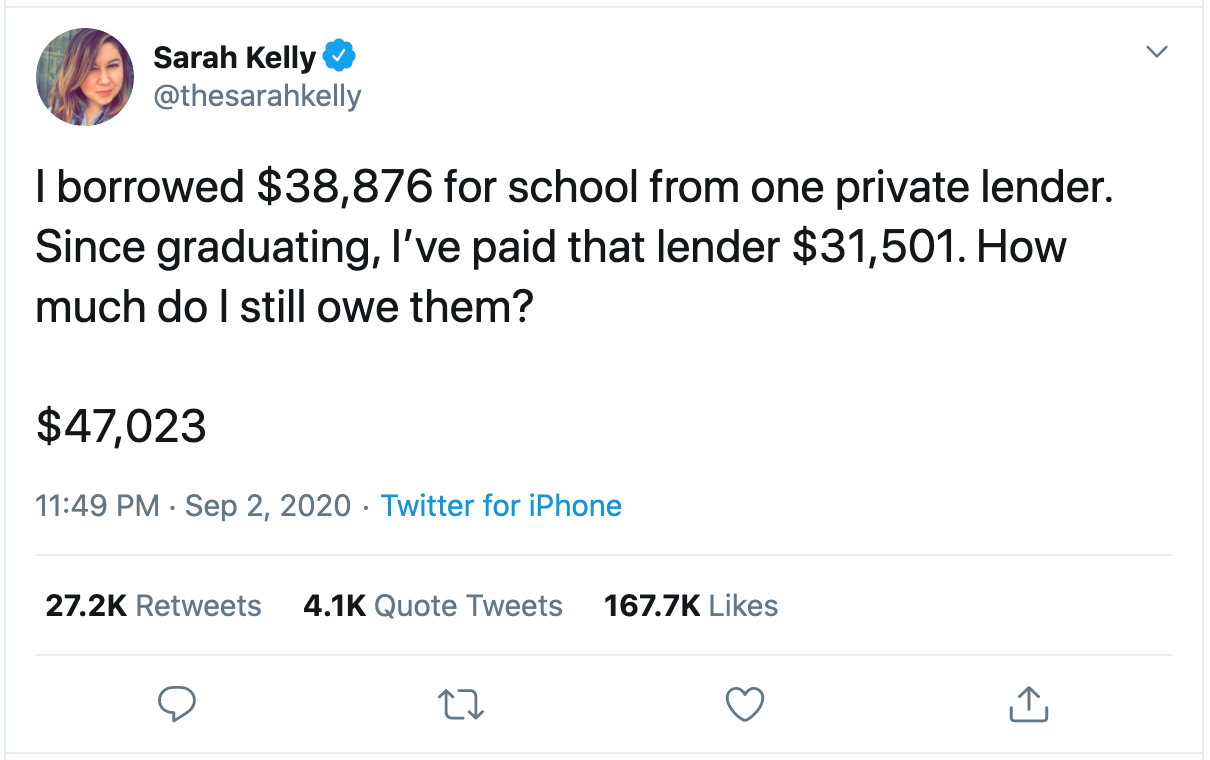
With high interest rates, many low-income graduates end up making low monthly repayments that lead to student loans that grow with time instead of shrink. Don’t let it happen to you.
Reason 2: For Most People, College is a Really Bad Investment
A college education doesn’t come cheap, which means many students resort to student loans to afford it. While student loans can certainly make the cost of college seem more manageable, many students discover a harsh reality once payments come due.
In 2017, the average student debt balance owed was $26,900 for graduates of public colleges and $32,600 for private four-year school graduates, according to a recent report by College Board.
The average monthly repayment falls between $200 and $300, although three out of ten borrowers are not required to make payments on their loans due to deferment. This is often to their detriment, as interest is continuously added to the amount owed. According to a recent CNBC article, some 25 percent of student loan borrowers are behind on their debt in 2020.
While having a degree may seem like a guaranteed increase to your earning power, more often than not it doesn’t translate into higher earnings.
According to recent Statista data, 42.6 percent of recent college graduates are underemployed, working jobs they didn’t need a degree for in the first place, often because they’re the first jobs they find. When bills are due, any job seems better than no job. What’s worse: debt can make you feel trapped and afraid of taking risks – like changing jobs – so it can be easy to get stuck in an unfulfilling, low-paying job.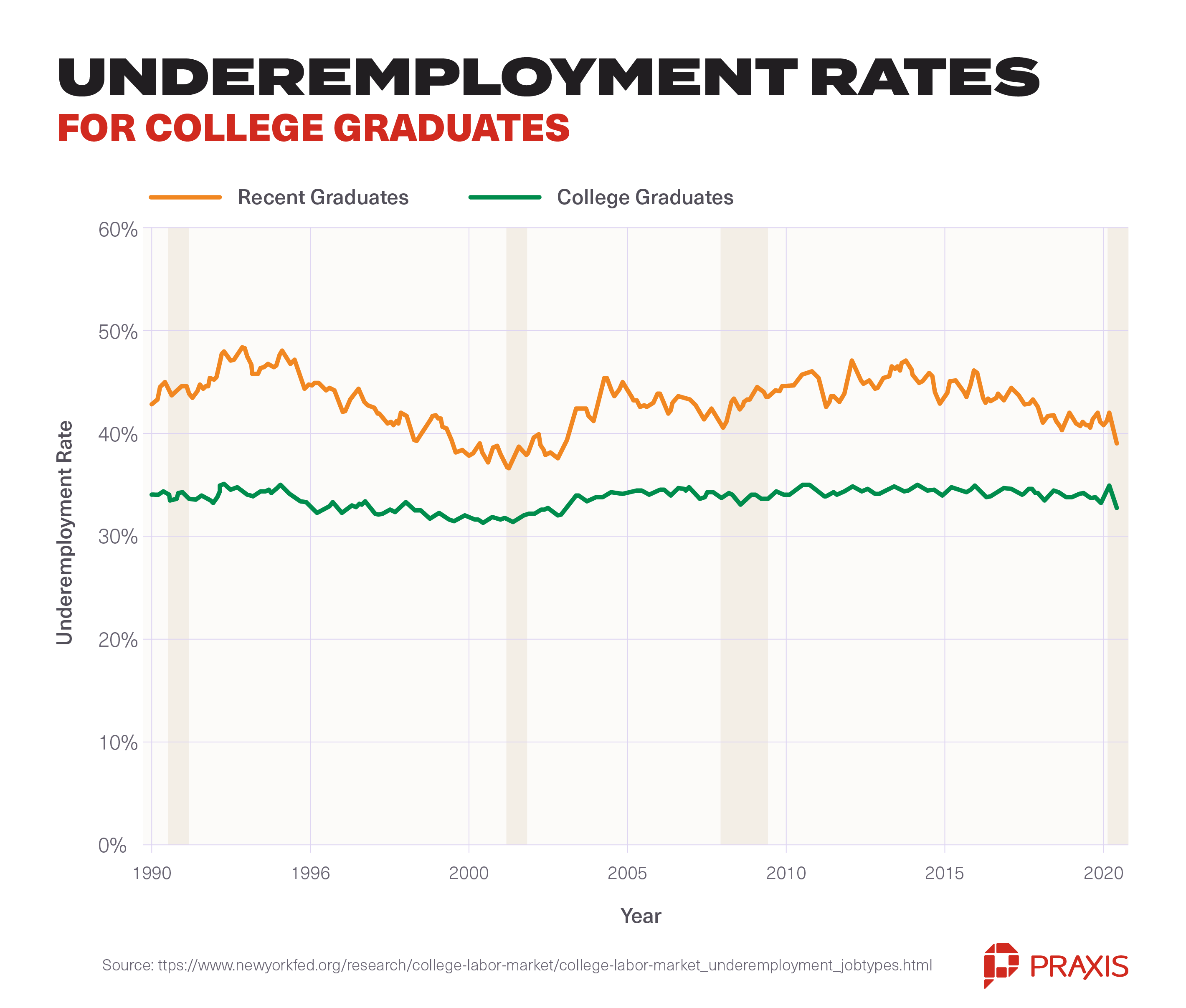
Reason 3: Experience Beats Textbook Knowledge
If you’re under the impression that a degree is necessary for a decent job, then pull up a chair and have a seat. Because we’ve got a little secret to let you in on. Degree requirements in job listings are often just a way to reduce the number of applicants. If you have the right skillset and attitude – and you know how to get your foot in the door and sell yourself – most hiring managers won’t even notice that you don’t list a degree on your resume. You just need to be willing to learn, work hard, and get a little creative.
Today, 37 percent of employers say experience is the most important qualification in a job applicant, according to a study by The Harvard Business Review. In large organizations (with more than 10,000 employees), experience wins out over a degree 44 percent of the time. According to 45 percent of recruiters and hiring managers, an applicant’s potential is the most important hiring consideration – not their educational attainment.

In today’s world, only two factors matter when it comes to winning opportunities:
- Your ability to create value
- Your ability to convince others you can create value.
If you can effectively do those things, you can write your check and create whatever life you want. This is why you need to a) build some valuable skills b) learn how to sell/market those skills.
The thing is, developing proficiency – and confidence in your proficiency – takes time and practice. It takes approximately 10,000 hours to master a skill (which will enable you to create value), and a college degree takes up around 8,000 hours that you could have spent getting really good at something and perfecting your ability to pitch yourself.
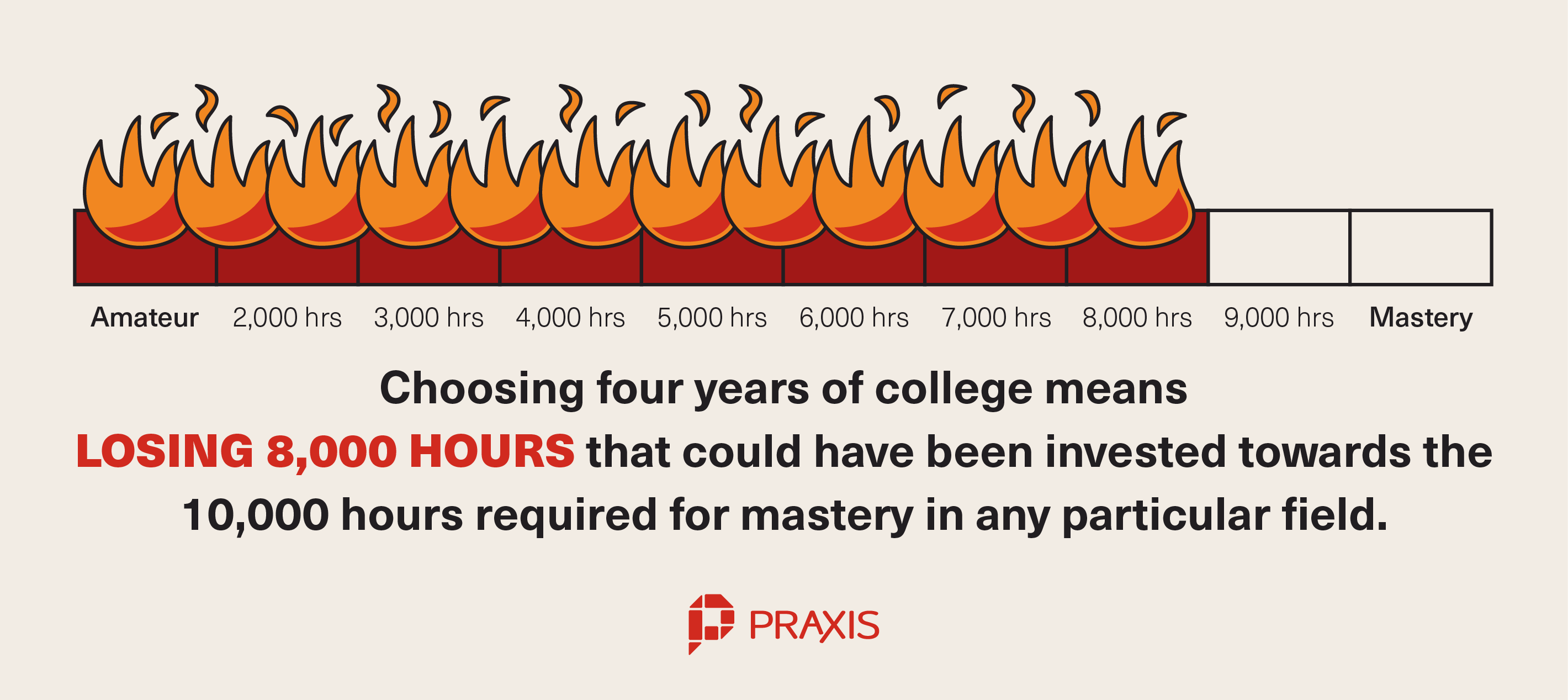
Reason 4: You Don’t Need College to Make Great Money
There are plenty of well-paying jobs out there that don’t require a bachelor’s degree. According to US Labor Department projections, 63 percent of all new jobs that will be created through 2020 won’t require a college degree.
More importantly, there are plenty of opportunities to make money by increasing the value you can create (and your ability to convince other people of the value you create).
Here are a few examples of jobs that typically don’t require a degree, keeping in mind that this is just a snapshot of the many opportunities available.
Also bear in mind that there’s an entire landscape of jobs that may list degree requirements, but these can easily be bypassed if you’re creative, hardworking, and daring enough to bet on yourself.
- Registered nurse – Median annual earnings: $73,550
- Administrative service manager – Median annual earnings: $90,966
- Construction supervisor – Median annual earnings: $62,192
- Wholesale or manufacturing sales rep – Median annual earnings: $58,383
- Electrician – Median annual earnings: $60,370
- Plumber – Median annual earnings: $53,910
- Insurance sales agent – Median annual earnings: $59,776
- Brickmason – Median annual earnings: $50,950
And that’s not even counting tech jobs that don’t require a degree:
- Data scientist – Starting salary: $96,000
- Front-end engineer – Starting salary: $63,500
- Java developer – Starting salary: $63,000
- Data engineer – Starting salary: $87,035
- Software engineer – Starting salary: $82,000
- Applications engineer – Starting salary: $59,230
- Business analyst – Starting salary: $58,340
- Systems engineer – Starting salary: $67,370
- Software developer – Starting salary: $66,800
- Cloud engineer – Starting salary: $82,780
You might be thinking “I don’t know anything about data science or coding, so none of that applies to me.” Sure, not yet. But four years is a long time. If you start teaching yourself the fundamentals today and work at it consistently for four years, you could be a more than proficient developer in four years. With coding bootcamps like CodingDojo, you can learn the basic skills needed to become a software engineer in as little as 14 weeks.
Entrepreneurship, sales, marketing, customer support, operations, and a huge number of opportunities in creative fields – these are just a few of the ways you can make good great money without going to college.
There’s absolutely nothing compelling you to follow the well-beaten W-2 path of working for someone else.
The gig economy is on the rise, as is the digital nomad lifestyle. Why limit yourself to jobs that follow the traditional 9-5 structure when you could read the four-hour workweek and live your best life working in the shade of a palm tree somewhere halfway around the world?
Reason 5: The Perceived Value of A College Degree Is Declining
There are more college graduates in America now than at any other point in history, with 33.4% Americans aged 25 and older holding a 4-year degree, per census data.
Problem is, the more people have bachelor’s degrees, the less valuable they become, causing degree inflation to become an issue. When everyone has a degree, it’s no longer a signal that differentiates the holder as exceptional, and before you know it, the jobs that require degrees from applicants start requiring Master’s degrees or PhDs.
According to Bryan Caplan, author of The Case against Education: Why the Education System Is a Waste of Time and Money, “You need to get more education now to get the same job that your parents or grandparents could have gotten with a lot less.”
Recent surveys have found that the perceived value of college degrees is declining rapidly. In 2013, 70 percent of surveyed Americans viewed a college degree as “very important.” By 2019, that number had dropped to 51%.
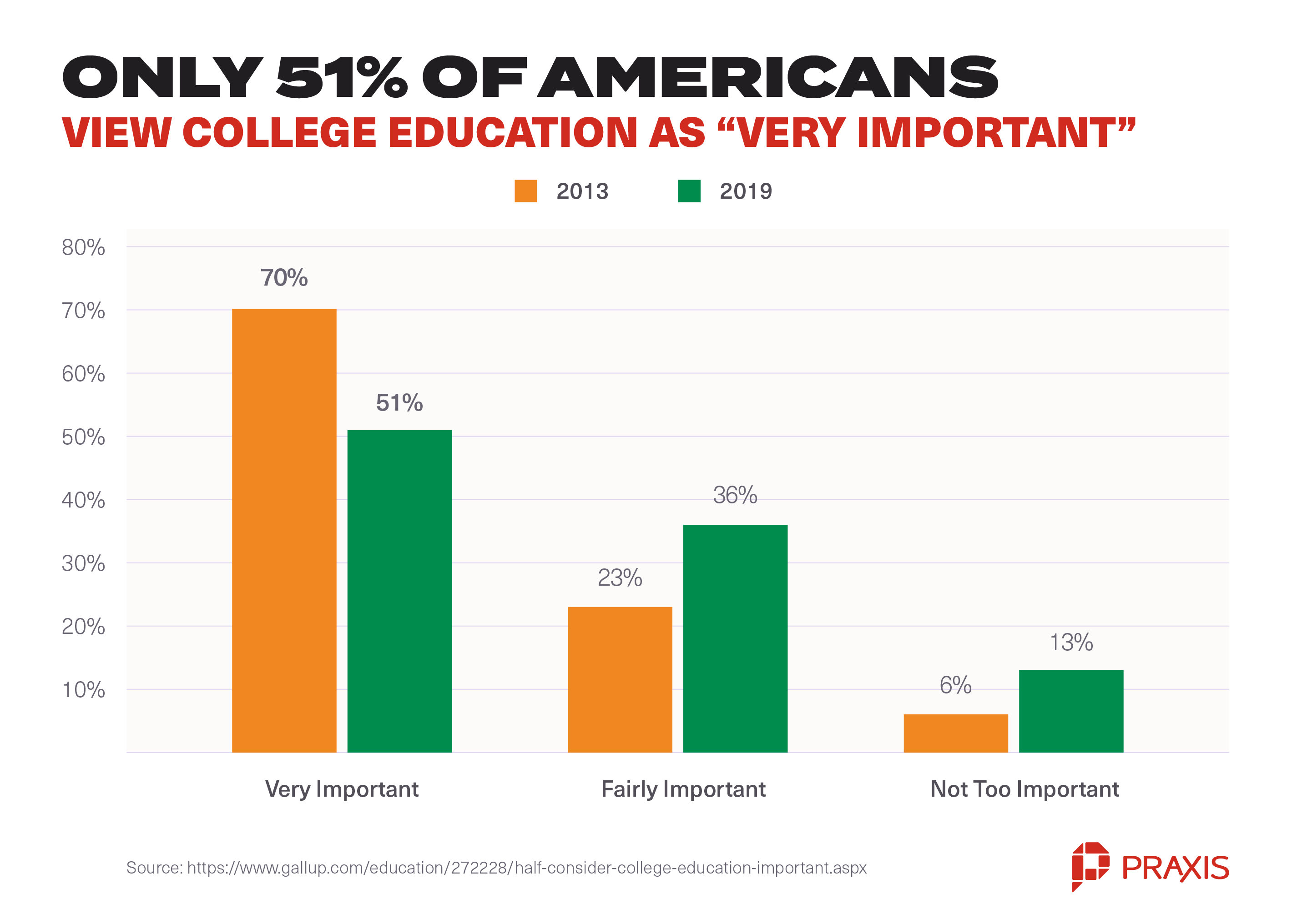
It gets even more interesting when you look at changing views about the importance of college in terms of age demographics.
Only 41 percent of 18-29-year-olds saw college as “very important” in 2019 and only 51 percent of 30-49-year-olds feel the same way.
That means only 46 percent of Americans under the age of 49 feel that college is important.
For a long time, getting a college degree seemed like the map to living the American Dream. But that’s changing. As more and more examples of self-made billionaires emerge and a growing number of young people realize that you can teach yourself just about anything if you’re driven and resourceful enough, the new roadmap to the American Dream is self-directed learning.
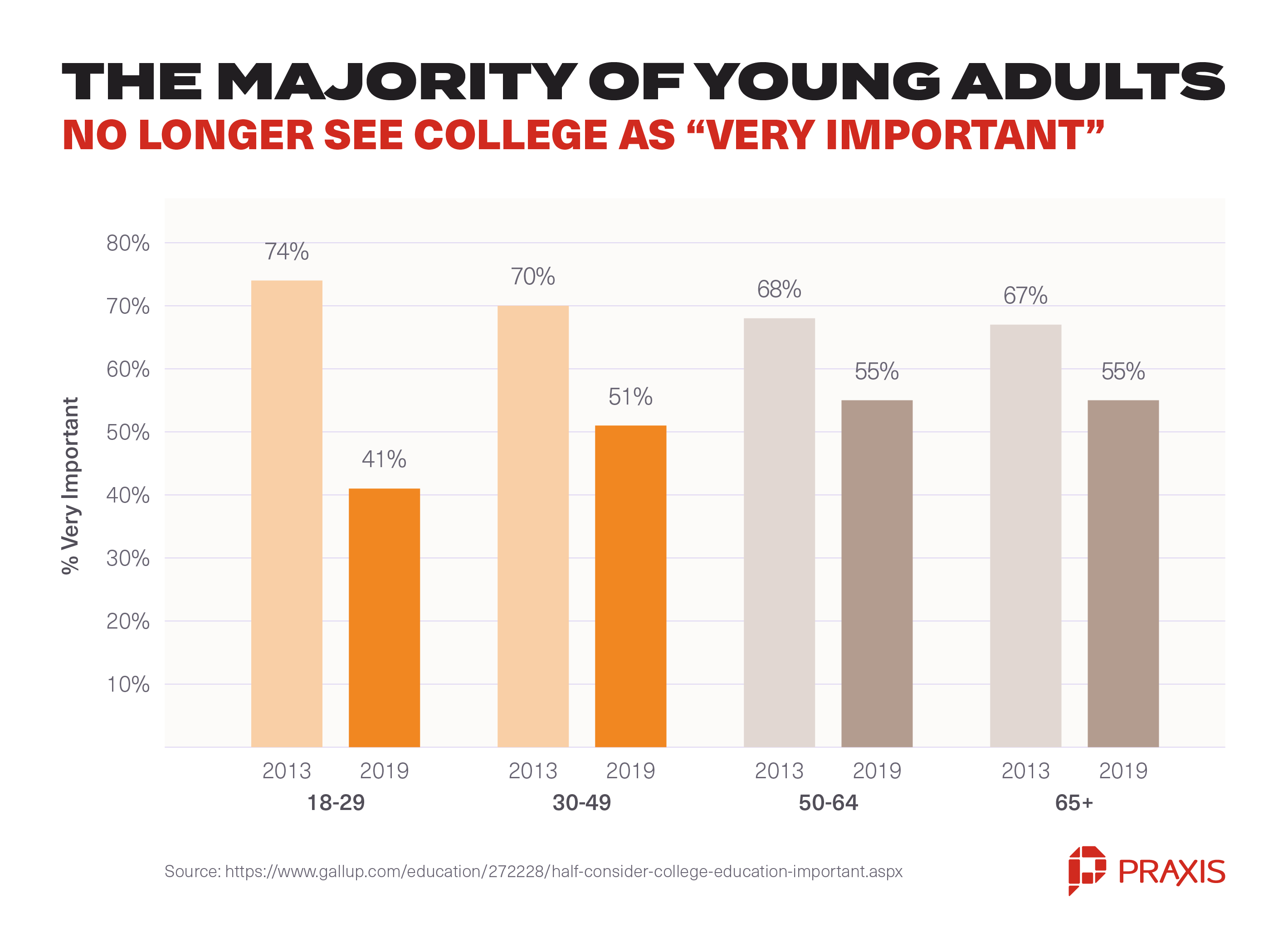
What Are My Options If College Isn’t For Me?
We know skipping college can be a scary path to choose when you’ve been told since childhood that going to college is absolutely necessary if you don’t want to end up working at the proverbial McDonald’s Drivethru.
The good news is, most of the traditional advice you grew up hearing about college is dead wrong. College is far from the only road to a fulfilling, well-paying job. If you’ve decided college is wrong for you, there are plenty of other options.
We’ve written about some of the options available in detail in our recent post about alternatives to college. Below are 12 more college alternatives to set you on the road to success if college just isn’t for you.
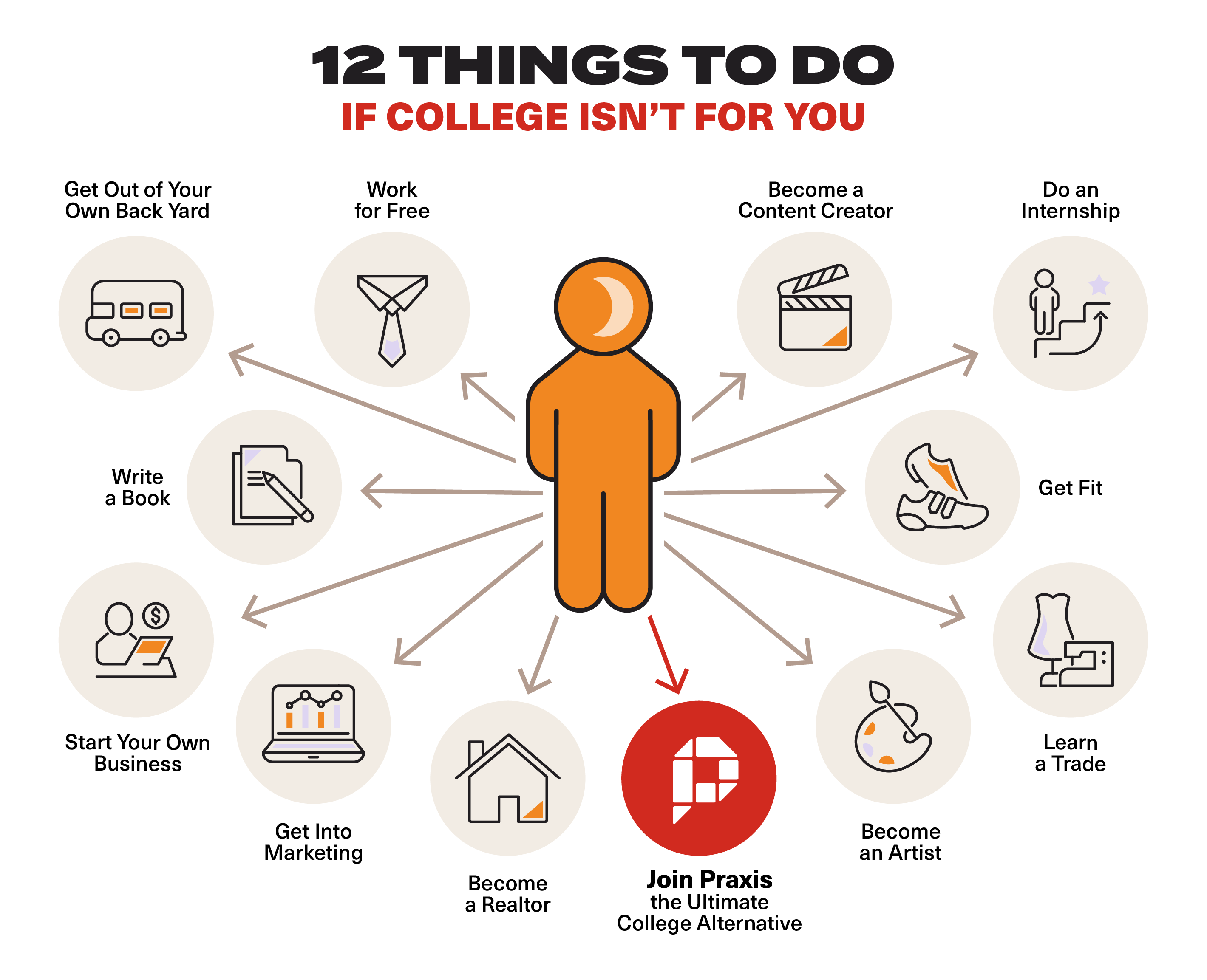
1. Get Out of Your Own Back Yard
A change of scenery might be just what you need to gain a fresh perspective and figure out what you want to do with your life. Moving away from home is a great way to assert your independence and you don’t need to be going to college to leave your hometown.
If you really want to see what “the college experience” is all about, you could even move to a college town, sit in on some classes, and enjoy the perks of campus life without the expense.
You could also see a bit of the world by doing something like WorkAway or teaching English abroad. There are plenty of countries where you don’t need a degree to teach English as a foreign language. You could even go sailing using a platform like Crewseekers – either as a work exchange or a paid crew position. Seeing the world is a great way to broaden your horizons, see what’s possible, and discover what type of life appeals to you.
2. Work for Free
It may seem counterintuitive, but working for free can be a solid investment in your future career. If you think of it in relation to what you’d pay to attend college, it’s an easier pill to swallow.
Working for free is a great way to gain experience, establish a portfolio of work, gain customers, and build your network. For instance, if you’ve taught yourself how to edit videos or build WordPress websites, you might offer your services for free at first in order to build up a portfolio and gain confidence in your skills.
If you do a good job, you can use the experience to pitch paying customers, or your first “clients” might refer more people to you. At the very least, you’ll quickly discover whether or not this is the kind of work you can see yourself doing long-term or not, and you’ll probably learn a thing or two about business and working with other people.
3. Write a Book
Whether you’ve always wanted to be a writer, or you’re just unsure what to do next, the only barrier to entry to writing a book is you. You don’t need an MA in creative writing to do it, either. Everyone has stories to tell, and exploring the recesses of your brain on a blank page is one of the most effective ways to get to know yourself.
With the ease of self-publishing today, you don’t even need to worry about finding a publisher.
If you’re unsure where to start, you can spend some time reading about writing first. Stephen King’s On Writing is a classic and as good a starting point as any.
4. Become a Content Creator
For a growing number of people, creating content and publishing it online is a viable way to make a living, thanks to ad revenue, affiliate marketing, and sponsored posts.
Whether it’s blogging on Medium or WordPress, creating a subscription newsletter on Substack, starting your own YouTube channel, building a TikTok empire, hosting an original podcast, becoming a popular Twitch streamer, creating helpful webinars or online courses, writing e-comics, or whatever floats your boat – being a content creator can be a full-time and well-paying job.
5. Get Into Marketing
Marketing can be a lucrative career choice if you put in the work to get good at it. Today, you certainly don’t need a degree to be a marketer (if you ever did). In fact, for a lot of the options on this list, you’ll probably have to teach yourself a thing or two about marketing.
Whether your goal is to market your own products or services or sell your services as a marketer, there are plenty of resources available to teach you a general foundation. Once you’ve got a good baseline understanding of marketing best practices, you can figure out which approach will work best for you and focus your learning efforts to specialize in the channels that are most likely to give you results.
Getting into marketing is easier than you might think.
Enjoying this content? Drop your email below and we’ll send you our best free resources on succeeding without college:
6. Do an Internship
Interning at businesses in industries you’re interested in can give you a huge jump start on the average college student by giving you varied work experience, insight into how different businesses work, and the soft skills to succeed in the workplace.
The fastest way to learn is by doing, so the more varied your early work experience, the faster you’ll develop your skillset and prepare yourself for the business world – whether that’s working for someone else or building your own business.
Pro tip: If you want a lot of hands-on work experience, Intern at a younger, growing business like a startup. They’re more likely to put you to work than just put you on coffee duty, so you’ll learn more, faster.
7. Start Your Own Business
You don’t need a business degree to start your own business. All you need is a good idea, some planning, and the will to work hard and learn the skills you’ll need for your business to thrive.
Here are 55 business ideas and a step-by-step guide to starting your own business, and an excellent guide to help you start making money with your new business.
In the age of the internet, you can maximize your income through multiple income streams. Check out this video if you want to get super inspired to start earning money.
8. Learn a Trade
Learning a trade like nursing, carpentry, plumbing, welding or any number of other in-demand skills is a quick way to start earning money without a degree.
In as few as 3-6 months, you could be entering the workforce as a nursing assistant, medical assistant, or CDL driver. In 6-8 months, you could be a qualified welder. More technical jobs like plumber or electrician take a bit longer, but it’s worth the time investment, as these jobs are currently seeing a skills shortage, which means they pay well. In 2019, the average annual income for an electrician was $60,370.
Whether you choose to go to a trade school or do an apprenticeship, vocational training is a cheaper, more practical alternative to college.
9. Become an Artist
If you’re a creative person, you could put your talents to use to make money. Now, if you think being an artist is limited to painting, sculpting, drawing, and photography, think again.
While you can certainly make money in traditional visual arts if you have a good head for business and marketing, there are many other ways to use your talent to make a living.
Graphic designers earn an annual average of $38,827 and experienced graphic designers earn as much as $70,325, while corporate illustrators earn an average of $63,030. You could also think about exploring a field like web design ($65,240) or user experience (UX) design ($102,364), both high-paying jobs that are seeing a boom in demand as every company under the sun needs a website and/or and app these days. Of course, these are all average salaries – you could make even more as a freelancer or agency owner.

10. Get Fit
Did you know that being physically fit can be a job? Okay, it’s not quite that easy, but there are plenty of ways to make money in the fitness industry, which is currently valued at more than $100 billion globally.
You could become a personal trainer, fitness coach, or fitness-related content and use it to become a fitness influencer on social media. There are plenty of people who have built careers through their workouts.
For instance, college dropout Mari Llewellyn built a successful brand selling her own supplements, workout guides, and merch, all based on the foundation of her Instagram account. What started as a personal growth project and a way to document her transformation journey became the basis of a thriving business
11. Become a Realtor
Real estate is one of the easiest self-starter careers to get into. While the specific requirements to get a real estate license vary slightly from state to state, the core requirements are as follows:
- Be older than 18 or 19 (depends on the state)
- Be a legal US resident
- Complete your required pre-license education (find your state’s requirements)
- Pass your state real estate license examination
It’s that simple. The rest comes down to how much you’re willing to invest in your personal development to build your sales and marketing capabilities.
Join Praxis, the Ultimate College Alternative
We developed Praxis to get right what colleges get wrong. Praxis is about providing value rather than simply transmitting information, giving our graduates the tools they need to succeed in the workplace.
We wanted to give the brave individuals who have enough faith in themselves to skip college a way to kickstart their careers by helping them nurture the practical skills needed to succeed in today’s business world.
With our self-directed learning approach, graduates emerge from our program armed with real-world skills, self-confidence, and hands-on work experience. Don’t want to take our word for it? Read one of our graduates’ stories about how Praxis helped him to develop his skills and apply them to real-world problems, and lit a fiery passion for entrepreneurship.
Praxis tuition costs $12,000, and 93% of Praxis participants graduate with a full-time job offer – with an average first-year income of $50K. Within your first six months of working, you’ll earn more than the cost of tuition. Plus, we’re so sure of the value of our program that we’re willing to tie our success to yours. That’s to say that if you’re not hired within six months of completing our bootcamp, you don’t pay a cent.
January 8, 2024
